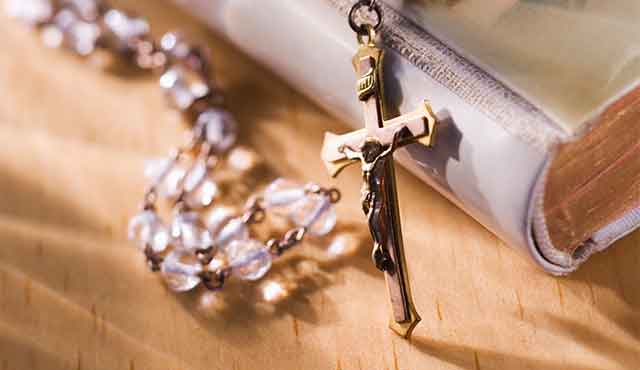Bill Cobbett wasn’t a Catholic when he married the love of his life, Sylvia, 49 years ago.
But she was.
Bill eventually was baptized and became a Catholic, which automatically made his union, in the eyes of the Church, sacramental.
Back when the Cobbetts wed, mixed-faith marriages—a Catholic marrying someone outside the church—were far less common than they are today.
Now, as many as 40 percent of married Catholics in the U.S. may be in interfaith marriages, according to foryourmarriage.org, a website operated by the United States Conference of Catholic Bishops which offers advice and tips for Catholic couples. And the numbers are expected to keep climbing.
According to an article on the website, the Church doesn’t encourage the practice of interfaith marriage due to the challenges such a relationship entails, but it does try to support interfaith couples and help them prepare to meet those challenges with “a spirit of holiness.”
The Cobbetts’ marriage has not only lasted nearly half a century, but together Bill and Sylvia have grown in their Catholic faith. Bill is a deacon at Sts. Simon & Jude Church in Huntington Beach, where his duties include preparing couples for marriage.
As Bill and others familiar with interfaith marriages see it, there’s no such thing as a “typical marriage.” Successful unions require compromise, honesty, trust and other essential qualities, regardless of the faith of the two parties.
Being of the same faith may help, especially when it comes to raising children, but it isn’t absolutely crucial.
“Each couple brings their individual experiences, hopes and dreams to a marriage, as well as their distinct and quite often very different personalities,” Cobbett says. “This is not changed by the fact that the two may both be Catholics.”
Of course, sharing the same faith may make things easier when it comes to Sunday plans, but for today’s modern couple, religious affiliation plays a much less important role than it used to, say experts—for better or worse.
“Religious practices for couples of different denominations used to be much more divisive, but not so anymore,” says Donna Erickson Couch, the Director of Faith Formation at St. Edward the Confessor Church in Dana Point.
“’Mixed marriage’ does not mean the same thing to young people today as it did to generations past; I would venture to say that it’s not even on their radar screen,” adds Couch, author of the book, “Together But Alone: When God Means Something Different to Your Spouse.”
Much more common today, Couch says, are Catholics married to “spiritual but not religious” partners, sometimes popularly known as the “nones”—those who believe in God but do not attach themselves to any religion, even if they are baptized.
“Free of the traditional boundaries surrounding marriage in the past, most of the Millennials and Internet-generation couples are not concerned about sharing the same religion,” Couch says. “They are used to having multiple choices for everything in their global world.”
There has been a steady decline over the last few decades in people getting married in the Church and in how important a role religion plays in nuptials.
“In general, I would have to say that in my experience, marriage in the Church is in jeopardy, especially among English-speaking Catholics,” Cobbett says.
For those marriages in which faith plays a central role but whose spouses practice different religions, the key question remains: How to raise children?
“In general, the spouse who has the strongest faith is in charge here,” Couch says. “Rarely do two spouses, even if they are both Catholic, share the same level of commitment.
“If spouses are both Christian, many do not see any harm in having kids formed in both denominations. If the dominant spouse is Catholic, religious practice, faith formation, etc., is usually the responsibility of one parent.”

